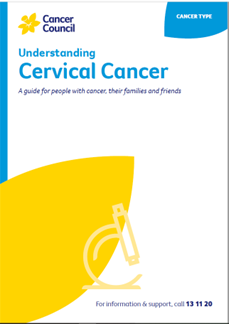- Home
- Cervical cancer
- Treatment
- Surgery
- Side effects of surgery
Side effects of surgery
After surgery for cervical cancer, you may have some side effects.
Problems with how the bladder works
Some of the nerves to the bladder may be affected by a hysterectomy. You may feel that you’re not able to empty your bladder completely or that you’re emptying your bladder very slowly. These problems usually improve with time. You may also find that you leak some urine after surgery. This is called urinary incontinence.
Learn more about bladder changes.
Constipation
The pain medicines used during and after surgery can cause constipation (difficulty having bowel movements). Your treatment team may suggest medicines to help prevent or relieve constipation. Once your surgeon says you can get out of bed, walking around can also help.
Learn more about bowel changes.
Lymphoedema
Sometimes removing lymph nodes in the pelvic area can stop or slow the natural flow of lymphatic fluid from the legs. This may cause lymphoedema – a build-up of fluid in the soft tissues under the skin – in the legs or genital area.
Learn more about lymphoedema.
Menopause
If your ovaries are removed and you have not been through menopause, removal will cause sudden menopause. After menopause, you will stop having periods and you will not be able to become pregnant. If you are finding it hard to manage the symptoms of menopause, you may be able to take menopausal hormone therapy (MHT).
Learn more about menopause.
Impact on sexuality
The physical and emotional changes you have after surgery may affect how you feel about sex, but surgery doesn’t change the ability to feel pleasure.
Learn more about impact on sexuality and intimacy.
Internal scar tissue (adhesions)
Scar tissue in the pelvis may stick together. Sometimes these adhesions, particularly to the bowel or bladder, may cause abdominal pain or discomfort. Rarely, adhesions may need to be treated with surgery.
Learn more about surgery.
→ READ MORE: Taking care of yourself at home
Podcast: Making Treatment Decisions
Listen to more of our podcast for people affected by cancer
More resources
Prof Martin Oehler, Director of Gynaecological Oncology, Royal Adelaide Hospital, and Clinical Professor, University of Adelaide, SA; Dawn Bedwell, 13 11 20 Consultant, Cancer Council QLD; Gemma Busuttil, Radiation Therapist, Crown Princess Mary Cancer Centre, Westmead Hospital, NSW; Dr Antonia Jones, Gynaecological Oncologist, The Royal Women’s Hospital and Mercy Hospital for Women, VIC; Angela Keating, Senior Psychologist, Royal Hospital for Women, NSW; Anne Mellon, Clinical Nurse Consultant – Gynaecological Oncology, Hunter New England Centre for Gynaecological Cancer, NSW; Dr Inger Olesen, Medical Oncologist, Andrew Love Cancer Centre, Barwon Health, Geelong, VIC; Dr Serena Sia, Radiation Oncologist, Fiona Stanley Hospital and King Edward Memorial Hospital, WA; A/Prof Megan Smith, Co-lead, Cervical Cancer and HPV Stream, The Daffodil Centre, Cancer Council NSW and The University of Sydney, NSW; Emily Stevens, Gynaecology Oncology Nurse Coordinator, Southern Adelaide Local Health Network, Flinders Medical Centre, SA; Melissa Whalen, Consumer.
View the Cancer Council NSW editorial policy.
View all publications or call 13 11 20 for free printed copies.

